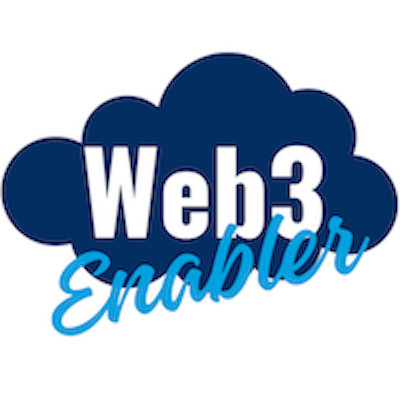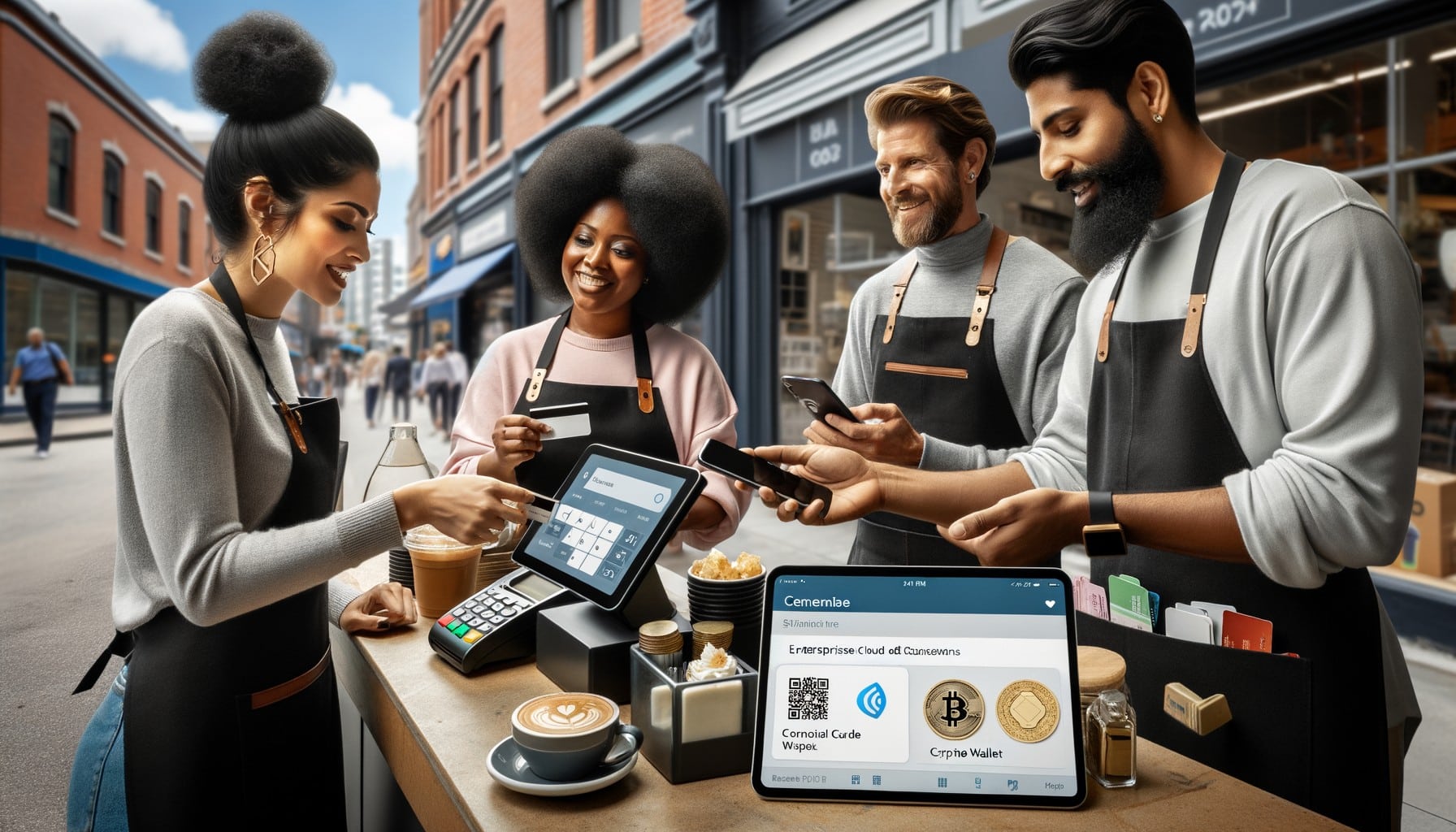Forget everything you’ve heard about corporate blockchain being a disruptive force. At Web3 Enabler, we’re here to show you how it can seamlessly enhance your existing business processes without turning your workflow upside down.
Ready to boost efficiency and security without missing a beat? Let’s explore how blockchain can work for you, not against you.
What Blockchain Really Means for Your Business
Blockchain 101: Beyond Crypto
Blockchain isn’t just for Bitcoin billionaires anymore. It’s a digital ledger that records transactions across a network of computers. Picture a super-secure, tamper-proof database that everyone can see but no one can alter.
For your business, this translates to enhanced transparency, improved traceability, and increased efficiency. A 2023 Deloitte survey revealed that 76% of executives fear losing competitive advantage if they don’t adopt blockchain. (Talk about FOMO!)
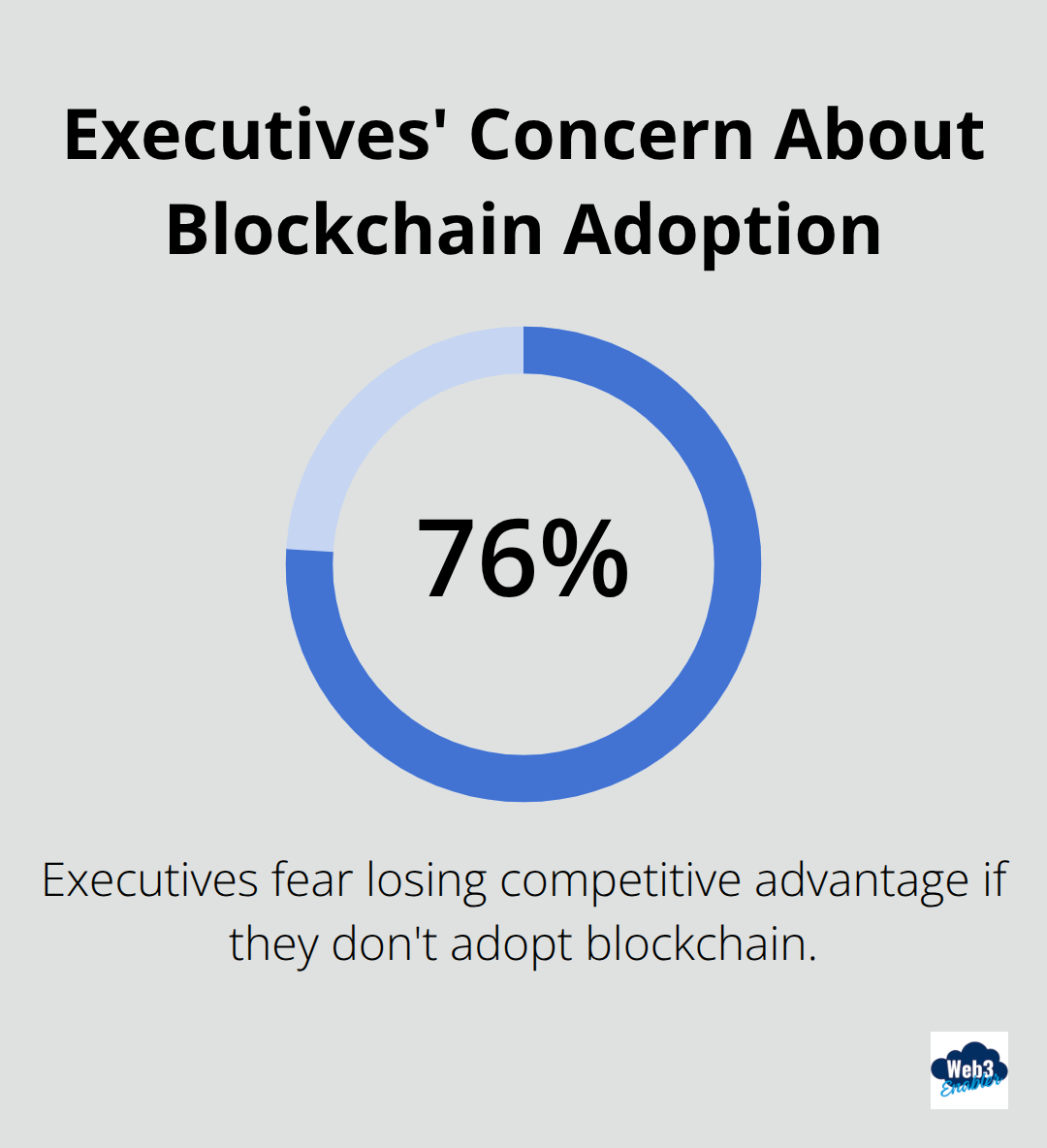
Myth-Busting Time
Let’s shatter some common misconceptions faster than you can say “crypto crash.”
Myth #1: Blockchain is only for finance.False! While blockchain cut its teeth in the financial world, it now makes waves across industries. From supply chain management to healthcare records, blockchain spreads its wings far and wide.
Myth #2: Implementing blockchain requires a complete system overhaul.Not at all! Blockchain can integrate smoothly with your existing infrastructure. No need to toss out the baby with the bathwater.
Myth #3: Blockchain is too complex for my business.Nonsense! With the right partner, blockchain can become as user-friendly as your favorite app.
Supercharging Your Processes
Here’s where blockchain really flexes its muscles. It doesn’t reinvent the wheel – it makes your current processes smoother, faster, and more secure.
Take supply chain management. Blockchain allows you to track products from manufacture to delivery in real-time. No more “he said, she said” in shipment disputes. A 2022 Capgemini study found that blockchain could slash supply chain barriers by up to 60% (Now that’s what we call efficiency!)
Contract management gets a boost too. Smart contracts on the blockchain automate execution, saving time and reducing errors.
And let’s talk data security. In an era where data breaches happen as often as coffee spills, blockchain offers fort knox-level protection. Each ‘block’ in the chain links cryptographically to the previous one, making data tampering virtually impossible to hide.
The Road Ahead
As we move forward, it’s clear that blockchain isn’t just a trendy tech toy – it’s a powerful tool that streamlines operations, boosts security, and gives you a competitive edge. But how do you actually implement this game-changing technology without disrupting your workflow? Let’s explore some seamless integration strategies in the next section.
How to Integrate Blockchain Without Breaking Your Business
Spot Your Blockchain-Ready Processes
Let’s play “Spot the Blockchain Opportunity” in your business. You should look for processes that involve multiple parties, require trust, or deal with transactions. Supply chain management, identity verification, and cross-border payments stand out as prime candidates.
For example, if you work in manufacturing, your quality control process might benefit from a blockchain makeover.
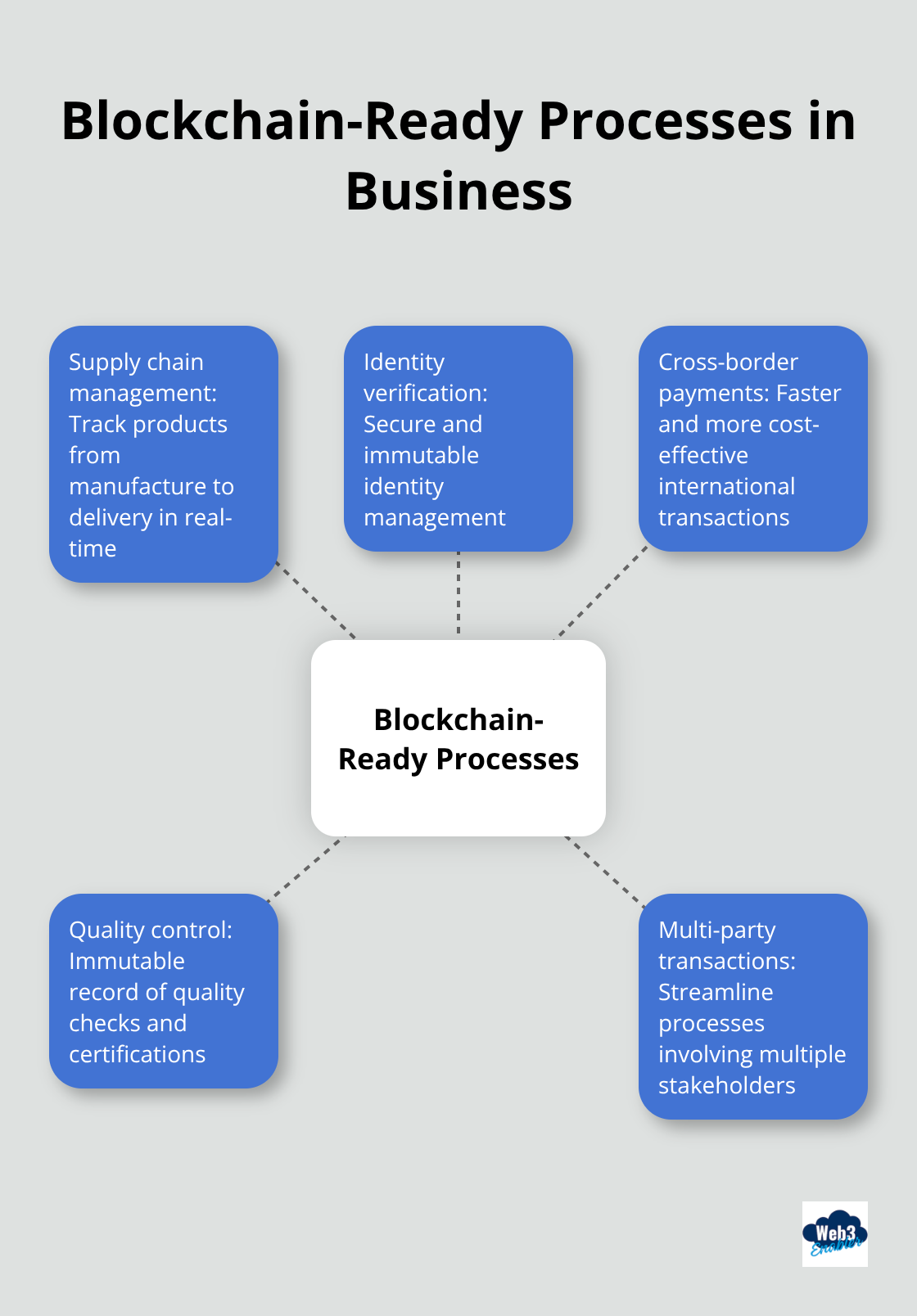
Pick Your Blockchain Flavor
Choosing the right blockchain solution is like picking ice cream – there’s a flavor for every taste.
Public blockchains like Ethereum offer maximum transparency, but they might be excessive for internal processes. Private or consortium blockchains provide more control and often fit businesses better.
Consider your needs. Do you want lightning-fast transactions? High-throughput blockchains like Solana might be the answer. Do you need robust smart contract capabilities? Ethereum could be your best bet. And if you prioritize enterprise-grade security, Hyperledger Fabric might be your ideal choice. Accepting payments from customers? Use Blockchain Payments to accept them all, with easy off-ramps to fiat.
Smooth Operator: Integrating Without the Drama
Now for the million-dollar question: How do you actually integrate this tech without turning your workflow into a soap opera?
Start small. Select a non-critical process for your pilot project. This approach allows you to iron out the kinks without risking your core operations.
Next, get your team on board. Blockchain isn’t just an IT thing – it’s a business thing. You should involve key stakeholders from different departments in the planning process. This cross-functional approach ensures smoother adoption and helps identify potential roadblocks early.
Try using blockchain-as-a-service (BaaS) platforms. These cloud-based solutions can significantly reduce the technical heavy lifting.
Lastly, don’t overlook your existing systems. Look for blockchain solutions that play nice with your current tech stack. Many blockchain platforms now offer APIs and plugins for popular enterprise software, making integration a breeze. (It’s like introducing your new blockchain friend to your old tech buddies – they’ll get along just fine!)
The journey to blockchain integration doesn’t have to be a rollercoaster ride. With these strategies, you’ll navigate the process smoothly. But don’t just take our word for it – let’s explore some real-world success stories in the next section to see how other companies have aced their blockchain implementations.
Who’s Winning with Blockchain?
Walmart’s Supply Chain Revolution
Walmart partnered with IBM to create a food traceability system using blockchain. This system allows Walmart to trace the origin of over 25 products from 5 different suppliers in seconds (a process that previously took up to 7 days). The result? A 50% reduction in the time it takes to trace food from farm to store.
But it’s not just about speed. Walmart’s blockchain solution improved food safety significantly. In the event of contamination, Walmart can now quickly identify the source and remove affected products from shelves (potentially saving lives and millions in recall costs).
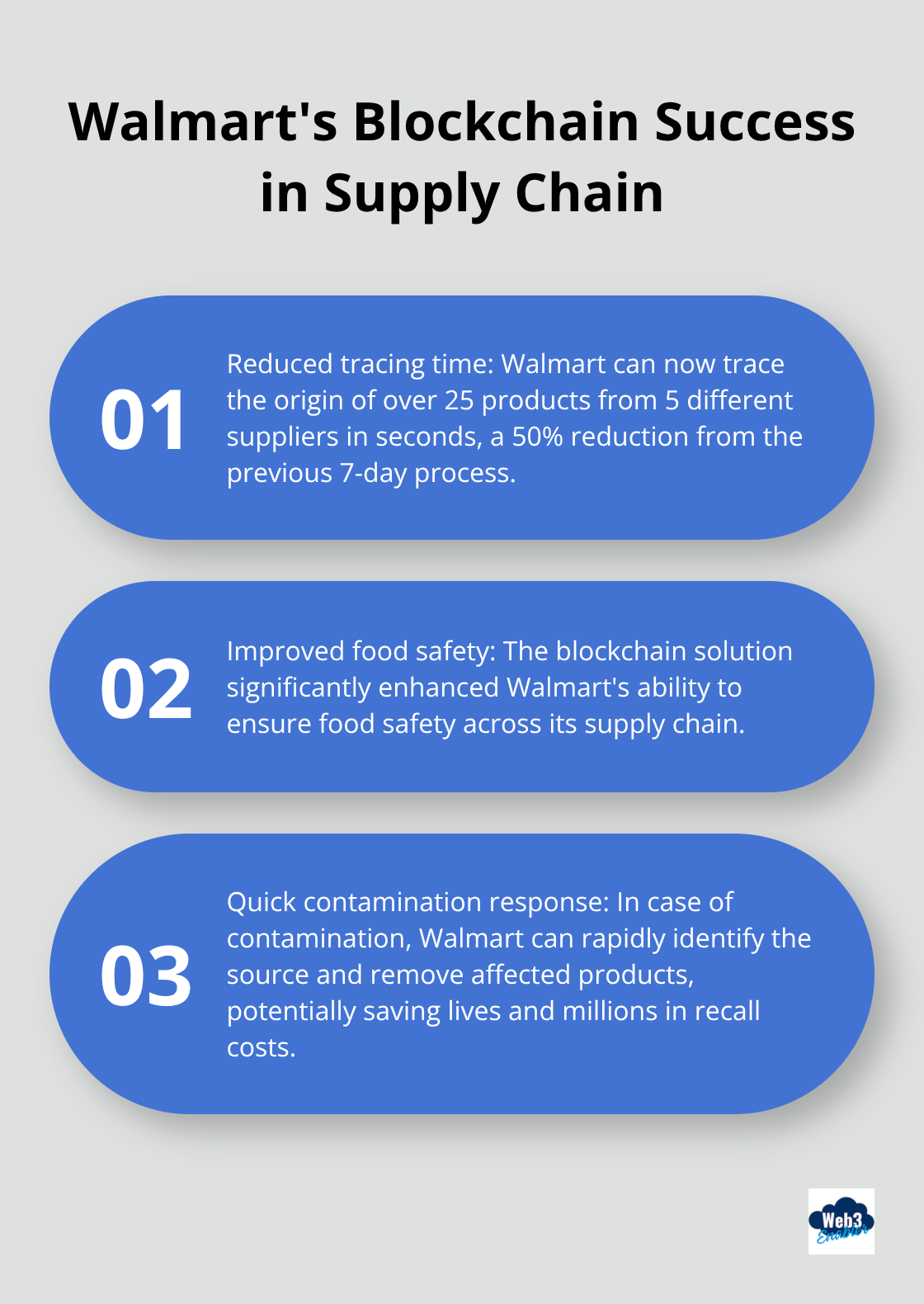
Maersk’s Shipping Transformation
Maersk, the world’s largest shipping company, collaborated with IBM to develop TradeLens, a blockchain-based platform for the global supply chain. This platform reduced the transit time of shipments by 40% and decreased the cost of processing documents by 15%.
TradeLens now has over 150 members, including major port operators, shipping lines, and logistics companies. The platform processes over 10 million events and more than 100,000 documents each week, proving the scalability of blockchain solutions.
De Beers’ Diamond Tracking
De Beers launched Tracr, a blockchain platform to track diamonds from mine to retail. This platform helped De Beers combat the issue of conflict diamonds and ensure ethical sourcing.
Tracr tracked over 100,000 diamonds since its launch. More importantly, it increased consumer confidence in De Beers’ products, leading to a 5% increase in sales for diamonds tracked through the platform.
Key Lessons from Success Stories
- Identify a clear problem to solve. Walmart focused on food safety, Maersk on supply chain inefficiencies, and De Beers on ethical sourcing.
- Find the right partners. All these companies worked with tech experts to develop their blockchain solutions.
- Start small, then expand. These companies initiated pilot projects before rolling out their solutions more widely.
- Measure outcomes. Whether it’s reducing processing time, cutting costs, or increasing sales, clear metrics help demonstrate ROI.
- Think about the broader ecosystem. The most successful blockchain implementations involve multiple stakeholders in the industry.
Final Thoughts
Corporate blockchain revolutionizes business processes without disrupting workflows. It enhances efficiency, transparency, and security across industries, from supply chain management to financial services. Companies that adopt this technology gain a competitive edge in today’s fast-paced business landscape.
The implementation of blockchain doesn’t require a complete system overhaul. Businesses can start small, identify blockchain-ready processes, and choose solutions that integrate seamlessly with existing infrastructure. This approach minimizes disruption and maximizes the benefits of blockchain technology.
Web3 Enabler specializes in connecting blockchain technology with existing corporate systems. Our Salesforce-native solutions support payments, compliance, and automation (helping businesses harness blockchain’s power without complexity). Take the first step towards a more efficient future for your business with blockchain technology.
